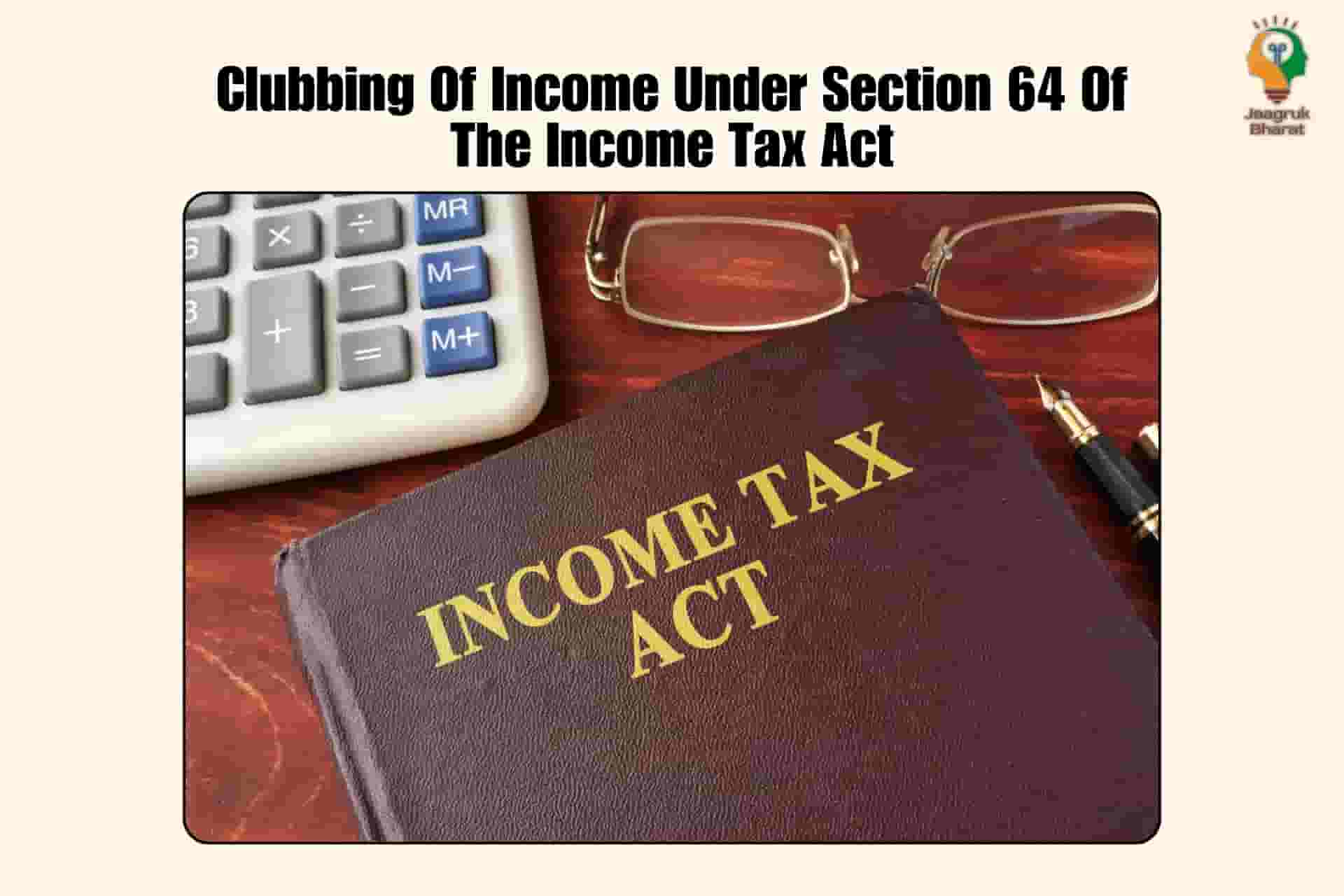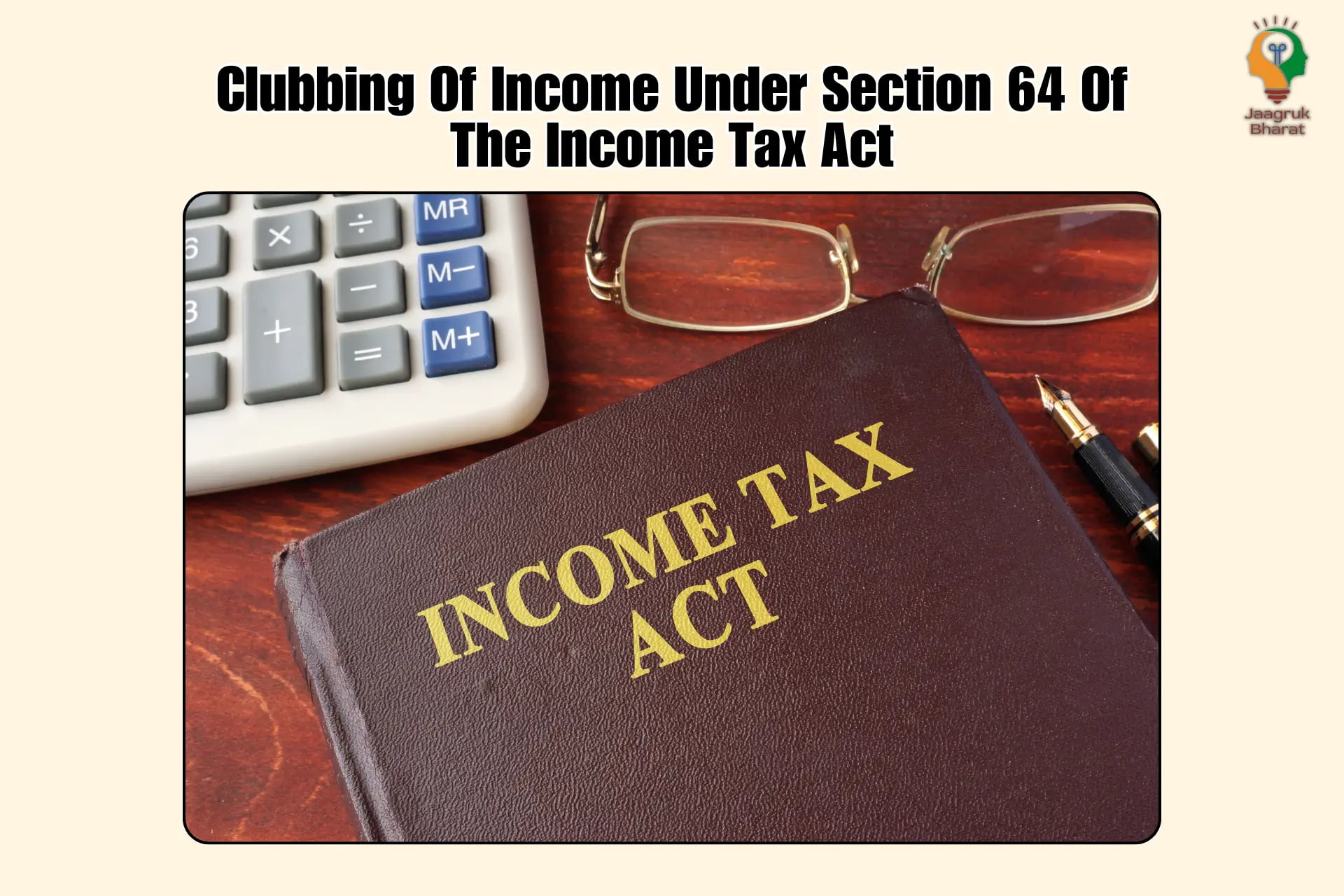Clubbing Of Income Under Section 64 Of The Income Tax Act Rule & Guidelines
Updated: 12-10-2025 at 6:51 PM
2k


In the world of tax planning, many individuals attempt to transfer assets or income to family members to reduce their tax liabilities. However, clubbing of income under Section 64 of the Income Tax Act comes into play, preventing such tax avoidance tactics by adding or "clubbing" the income of specified persons to the income of the taxpayer. This provision ensures that income is taxed in the hands of the person who is ultimately in control of the asset or income. Understanding the nuances of these clubbing provisions can help individuals make informed financial decisions.
Read More: Received Intimation Notice Under Section 143(1)? Here is Everything You Need To Know!
What Is Clubbing of Income?
Clubbing of income includes another person's income, in this case, that of a spouse, parent/child etc in your income. The Income Tax Act has therefore laid down guidelines in Section 64 that control when one’s income tax might be clubbed with others. It should be emphasised that clubbing of income can only be applied to certain defined persons and situations as laid down in the law.
Specified Persons For Clubbing of Income
As per Section 64 of the Income Tax Act, the income of certain persons can be clubbed with that of the taxpayer. These persons include:
-
Spouse
-
Minor child (including step-child and adopted child)
-
Daughter-in-law
-
Any person or association of persons for the benefit of the spouse or daughter-in-law
-
Hindu Undivided Family (HUF)
Read More: Decoding Income Tax Act 1961 Section 44 AD! What You Need To Know?
Scenarios For Clubbing Of Income
The following sections under Section 64 of the Income Tax Act outline specific situations where income is clubbed:
-
Section 60: If a taxpayer transfers income without transferring the ownership of the asset, the income from that asset will be clubbed with the transferor's income.
-
Section 61: If a taxpayer transfers an asset on the condition that it can be revoked at any time, the income from such an asset will be clubbed in the hands of the transferor.
-
Section 64(1A): The income of a minor child will be clubbed with the income of the parent whose income is higher. A tax exemption of Rs. 1,500 per minor child is allowed if the parent opts for the old tax regime. Exceptions include income earned by a child from manual work or any talent or expertise and income of a disabled child.
-
Section 64(1)(ii): If a spouse receives any remuneration (salary, commission, or fees) from a concern for which the taxpayer has a substantial interest, the income is clubbed with the income of the taxpayer or the spouse, whichever is higher.
-
Section 64(1)(iv): Any income arising from assets transferred to the spouse for inadequate consideration is clubbed in the hands of the transferor. Exceptions include assets transferred before marriage, as part of a divorce settlement, or if no husband-wife relationship exists at the time of income accrual.
-
Section 64(1)(vi): Income from assets transferred to the daughter-in-law for inadequate consideration will be clubbed with the transferor's income.
-
Section 64(1)(vii & viii): Any income from assets transferred for inadequate consideration to benefit the spouse or daughter-in-law, either immediately or in the future, will be clubbed with the transferor's income.
-
Section 64(2): If a member of a HUF transfers individual property to the HUF for inadequate consideration, the income from that asset will be clubbed with the individual's income.
Read More: Filed ITR But Didn’t Get A Tax Refund Yet? Here’s How To Request A Reissue
Example Of Clubbing Of Income
-
Example 1: Mr P has a rental agreement for giving out monthly payments of Rs. 12,000 although he does not transfer the shop. This rental income will under Section 60 be clubbed with Mr P’s income.
-
Example 2: Jay’s 21% shares of the company and his wife Mrs Jay works in the company as a finance manager who does not have proper credentials. The income which Mrs. Jay has earned as a salary will be combined with the income of Mr. Jay according to Section 64(b)(1)(ii).
-
Example 3: Mr Lucky transferred Rs. 6,00,000 to his wife and one FD lodged out of it provides her annual returns of Rs. 5,000. In this case, the interest of Rs. 5000 earned by Lucky’s wife would also be treated as a part of Mr. Lucky’s income due to Section 64(1)(iv).
Read More: Indexation Benefit On LTCG Back | Good News For Real Estate Enthusiasts
How To Avoid Clubbing Of Income?
We will List down the common practices of avoiding the clubbing of income:
-
Shake-off with Parents: Such a gift is exempt from tax. Any income earned from such investments say interest on a fixed deposit, will get taxed in the hands of the parent.
-
Gifts on Marriage: Gifts on the day of the wedding are not taxable and hence the income from these gifts shall not be clubbed.
-
Investment in PPF: Investment in Public Provident Fund (PPF) by the name of a spouse or minor child shall not be liable to clubbing provisions as there is no tax on the income derived.
Key Points To Remember
-
Clubbing applies to both income and losses.
-
Capital gains from further transfer of the asset by the transferee will be clubbed with the transferor's income.
-
If only part consideration is paid, only the inadequately considered part will be clubbed.
-
Income earned from the reinvestment of clubbed income is not subject to clubbing provisions.
Read More: How Are Long-Term Capital Gains (LTCG) Taxed After The Union Budget 2024?
Filing And Disclosure In ITR
If your income includes amounts under clubbing provisions, you must disclose these details in the appropriate ITR form (ITR-2/3). The income should be reported under the respective head and well-defined disclosure should be made in the Schedule SPI of the ITR.
For more knowledge like this, connect to Jaagruk Bharat now and interact with us through our Community Page.
Important Links
Official Website: https://www.incometax.gov.in/
Contact Information: https://www.incometax.gov.in/iec/foportal/contact-us
Frequently Asked Questions
0
0
2k
0
0
2k Views
0
No comments available





Our Company
Home
About
T&C
Privacy Policy
Eula
Disclaimer Policy
Code of Ethics
Contact Us
Careers
Cancellation & Refund Policy
Categories
Women
Insurance
Finance
Tax
Travel
Transport & Infrastructure
Food
Entertainment
Communication
Government ID Cards
E-commerce
Traffic guidelines
Miscellaneous
Housing and Sanitation
Sports
Startup
Environment and Safety
Education
Agriculture
Social cause
Employment
Disclaimer: Jaagruk Bharat is a private organization offering support for documentation and government scheme access. We are not affiliated with any government body. Official services are available on respective government portals. Our goal is to make processes easier and more accessible for citizens.
All Copyrights are reserved by Jaagruk Bharat